March 28, 2006
Posted by: annika at
12:20 AM
| Comments (3)
| Add Comment
Post contains 23 words, total size 1 kb.
March 27, 2006

The One And Only, Genuine, Original Family Band, 1968
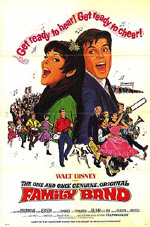 This was a pleasant surprise. I really liked this movie, though I didn't think I would. The concept couldn't sound more boring, even to a history buff like myself. It's set during the contentious presidential election of 1888, between Democratic incumbent Grover Cleveland and Republican challenger Benjamin Harrison. Not exactly a formula for box office bonanzae, even back in 1968. I'd hate to have been the one pitching this one to Disney:
This was a pleasant surprise. I really liked this movie, though I didn't think I would. The concept couldn't sound more boring, even to a history buff like myself. It's set during the contentious presidential election of 1888, between Democratic incumbent Grover Cleveland and Republican challenger Benjamin Harrison. Not exactly a formula for box office bonanzae, even back in 1968. I'd hate to have been the one pitching this one to Disney:
Mr. Disney: Hmm. I don't know. Who did you have in mind to play the lead?Originally intended as a two part tv movie, TOAOGOFB was based on the exploits of some real life historical figures, the Bower family of South Dakota.Pitcher: Well, John Davidson's available, and Walt Brennan's signed on.
Mr. Disney: Uhhh. Who else?
Pitcher: And Buddy Ebsen.
Mr. Disney: Errr. The Beverly Hillbillies guy? Is that all? I don't know.
Pitcher: Oh... and uh, I think we can get Kurt Russell.
Mr. Disney: Russell? Why the hell didn't you say so?! That kid's gold! When can you start production?
The Bowers became quite popular in the area because they had they own family band. . . . At the time, there was only one brass band west of the Missouri River, the military band attached to the Seventh Regiment, then stationed in Fort Meade. The military band was scheduled to perform at [a] celebration. Calvin [Bower] went to extreme measures and was successful to persuade the committee to also book his Family Band to play for the occasion.In the movie, the fictional Bowers are divided along party lines with Grandpa (Walt Brennan, who else?) a cantankerous Democrat, and his son (Buddy Ebsen) a quiet Republican. Brennan's granddaughter gets involved with a dashing Republican newspaperman (John Davidson). He convinces the whole family to move to the Dakota territory, hoping they'll add to the solid Republican majority.. . . When the chairman called for music, the leader of the Fort Meade Band responded. After the speaker spoke, the chairman hardly rose when the Bower Band began to play without permission. The Bowers took the crowd by surprise and there was much clapping and shouting. It took the breath right out of the Fort Meade band and they folded up their music racks and left the platform. This was the introduction of the Family Band to the Black Hills.
Davidson and the local Republicans are working to get Dakota admitted to the Union as two separate states, in order to shift the balance of power in congress with the addition of four Republican senators.* Davidson gets a shock when he finds Walt Brennan in the schoolhouse, doing a sort of 19th Century Jay Bennish act for the kids.
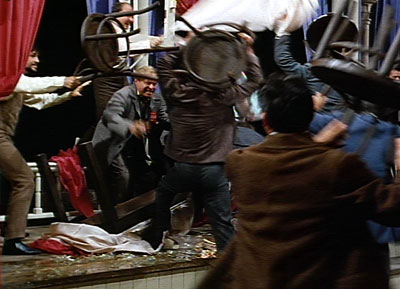
The eerie topicality of TOAOGOFB is one of the delights of this movie. The musical numbers are horribly bad** (with the notable exception of the finale, which is Goldie's only scene), but I laughed out loud at the unexpected parallels between 1888 politics and today.
Besides the issue of overtly political schoolteachers, the movie touches on political demagoguery, freedom of speech and dissent, and even stolen elections. As you all should know (I'm not ruining anything for you) Benjamin Harrison won the 1888 election despite losing the popular vote by over 90,000. During the movie's election night party scene, the Democrats' elation turns to violence when they find out that their man lost after the electoral votes were tallied. A riot starts and the meeting hall gets trashed. It only stops when the One and Only, Genuine, Original Family Band plays "My Country 'Tis Of Thee" to calm the crowd down.
After the brawl, Buddy Ebsen gets up to address the partisans with words that are appropriate whether the date be 1888, 1968 or even 2006:
All of us here together can build the greatest united country in the whole bloomin' world if we'll just remember one thing. There's a time to stand up and fight for what you believe in, and there is a time to join hands and work together, or all the fighting doesn't mean a thing.The teenaged Kurt Russell made the most of his small part. Despite the fact that he hated dancing, Kurt acquited himself well during the musical numbers. Goldie's one-line part featured some pretty good dancing, as well as her trademark smile. The big scene involves a sort of dance-duel between Lesley Ann Warren and John Davidson as they try to make each other jealous by do-si-do-ing with other partners. Goldie is Davidson's "other partner."
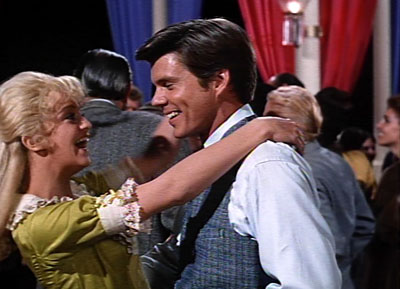
There are no scenes between Goldie and Kurt; and their off screen romance developed many years later. Goldie's memoir, A Lotus Grows In The Mud, includes the story of how she met Kurt the second time, during the casting of 1984's Swing Shift. Goldie apparently didn't even recognize Kurt, and although he remembered Goldie, Kurt had a big crush on Lesley Ann Warren at the time. Funny how the two of them were in the same movie without realizing that they were soulmates until sixteen years later!
I totally recommend TOAOGOFB, but only if you are prepared for the odd combination of Gilded Age politics and good old fashioned Disney schmaltz. I give it 3½ stars.
_______________
* As you all know, in 1888, Senators were elected by the state legislatures.
** I can't emphasize enough how bad the songs are. The libretto includes a rousing tribute to Grover Cleveland, "Let's Put It Over With Grover," (don't rock the boat/ give him your vote...) and a similarly pukeworthy paean to Benjamin Harrison, titled simply "Oh Benjamin Harrison," (he's far beyond comparison...). However, the final dance number, "West O' The Wide Missouri," is well choreographed and the song is pretty catchy. Also, 60 year old Buddy Ebsen showed he could still do a nice soft shoe routine.
Posted by: annika at
09:29 AM
| Comments (3)
| Add Comment
Post contains 1015 words, total size 7 kb.
March 18, 2006

The Duchess and the Dirtwater Fox, 1976
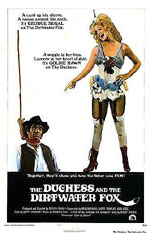 Starring Goldie Hawn and George Segal (whom I loved in one of the meanest movies ever, the classic Who's Afraid Of Virginia Woolf?).
Starring Goldie Hawn and George Segal (whom I loved in one of the meanest movies ever, the classic Who's Afraid Of Virginia Woolf?).
The interesting thing about Duchess is how different Goldie's character is from her more timid roles of the early seventies. It seems that her roles had gradually become more assertive with each film, and this one went way off the scale.
The movie opens with Goldie and another chick rolling on the floor in a full-on bitch fight. She talks like a sailor, punches people out, handles a Winchester like a pro, and even flips the middle finger in one scene. A recurrent motif in the film are a couple of embroidered pasties that keep falling out of Goldie's purse at inopportune moments.
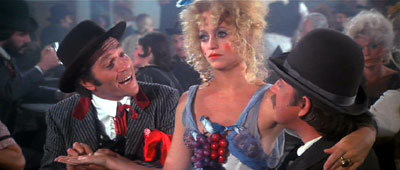
Goldie plays a hooker/cabaret dancer in 19th century San Francisco, who's always on the make. Segal plays a small time crook/gambler who's also always on the make. A bag of stolen money brings them together, and as I like to say, hijinx ensue.
At first Goldie doesn't like Segal, who's all hands when they first meet. But then she finds out about the money and plays along until she can steal it from him. He chases her, and a gang of outlaws chases him. Somehow or another Goldie gets mixed up with a band of Mormons on their way to Salt Lake City, including the great Conrad Janis. (I think there's the obligatory shot of a stagecoach going over a cliff, which must be stock footage because I've seen it in so many westerns it's not even funny.)
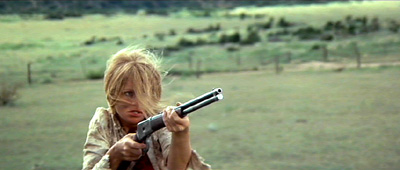
The comedy is pretty hit or miss, but the funniest scene takes place inside the stagecoach between Goldie and Segal. They're trying to concoct a scheme without Conrad Janis, who's sitting between them, figuring out what they're saying. So they speak in a comical pidgin German that's really well done.
The rest of the movie is kind of juvenile and the situations seem contrived. Goldie realizes she loves the gambler in the middle of a chase scene, while they're pretending to be guests at a jewish wedding. Later, they have sex in a rowboat, before going through the rapids. The bad guys eventually catch up with our heroes and tie them to stakes in the desert.
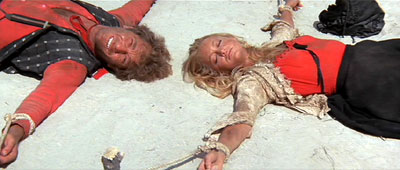
Finally, everything works out for the best, but I forgot if they get to keep the money or not. Costume-wise, the movie is heavy on red and black. The costume designer must have been a big Stendhal fan, I guess. One highlight of the movie is when Goldie sings a bawdy song called "Please Don't Touch Me Plums" with a bunch of kids, Julie Andrews style. Fans of Bobby Vinton should also like the sappy theme song, "Lemon Drops, Lollipops And Sunbeams."
Consider me not one of Bobby Vinton's fans. Nor am I a big fan of The Duchess and the Dirtwater Fox, which I gave two stars on the Neflix scale. Goldie's performance was a standout (she was nominated for a Golden Globe). But the chuckles in this screwball comedy were too few and far between, and couldn't overcome the generally mediocre script.
Foul Play, 1978
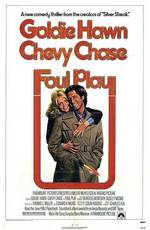 This is the first of Goldie's two romantic comedies with co-star Chevy Chase. It's also an homage to the Hitchcock thriller The Man Who Knew Too Much, which is one of my favorites.
This is the first of Goldie's two romantic comedies with co-star Chevy Chase. It's also an homage to the Hitchcock thriller The Man Who Knew Too Much, which is one of my favorites.
Despite his work in the classics Caddyshack, Vacation and Fletch, I've never really warmed up to Chevy Chase. I'm not quite sure why. In Foul Play, he's a San Francisco detective who protects Goldie Hawn from a gang of assassins out to kill the pope. I suppose people thought Chevy was sexy in those days, but he does nothing for me. Still, the romantic scenes between him and Goldie happen to be the most convincing of any movie she'd done so far.
Goldie's part was a complete 180° from her character in Duchess. In Foul Play, Goldie is a 30-something divorcee who's cute but dissillusioned by the dating scene and looking down the barrel of spinsterhood. She actually reminds me a lot of Meg Ryan's character in When Harry Met Sally, even down to the oversized 80's glasses.
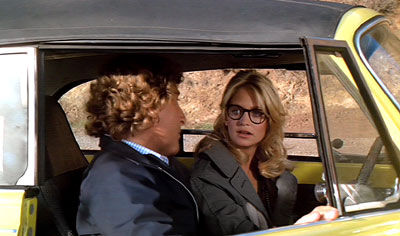
There's not much to Goldie's character; she's kind of an everywoman who's only purpose is to hold the silly plot together. I can't help but like this movie though, despite it's myriad flaws. It's the supporting cast that makes Foul Play as enjoyable as it is. Look who else is in it: Brian Dennehy, Burgess Meredith, Billy Barty and Dudley Moore. (All are dead now, by the way. And don't tell me Brian Dennehy is still alive. You and I both know that Brian Dennehy and Brian Keith are/were the same person.)
Two scenes are absolutely worth the price of the rental. The first is the legendary American debut of Dudley Moore, which is the one scene everybody probably remembers most. While Goldie is trying to hide from a villain known only as "the albino," she asks Dudley Moore to take her back to his place. He misunderstands, thinking he's going to get lucky. It's rotfl funny, with Dudley's valentines day boxers, and the disco ball, and the helium filled blow-up dolls, and the murphy bed with its little trumpet fanfare. That one scene propelled Dudley Moore to stardom, and the next year he did 10 with Bo Derek.
Here's an interesting bit of Dudley Moore/George Segal trivia, which I got from IMDb.
[Dudley Moore was] the first choice to play Henry Fine in "The Mirror Has Two Faces," only to be replaced by George Segal (who was, ironically, replaced by Moore in the role of George Webber in "10"). In an interview following his announcement that he had supranuclear palsy, he revealed that he was dismissed from the role because he had trouble remembering his lines.The second most memorable scene in Foul Play is when Burgess Meredith kicks the villainess's ass in a kung-fu fight. That's pretty much all I need to say about that crazy scene.
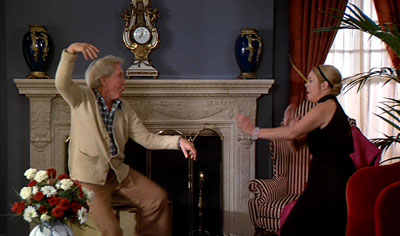
I did run into a little suspension of disbelief issue when Chevy and Goldie were racing through San Francisco trying to get to the Opera House in time to foil the assassination plot. They seemed to be driving through all the wrong neighborhoods. Maybe I know the City too well, but I was like: "Dude, it ain't that hard. Just take Gough, you'll get there in five minutes."
The costumes weren't all that hot. Goldie wears a lot of nondescript solid color sweaters. She ends the movie in a disco era powder blue décolleté that I don't like at all. The music however, was a strong point for me. Barry Manilow sings the Oscar nominated theme song and, as you know, I love Barry. Plus, Gilbert and Sullivan's The Mikado is featured throughout.
I'm giving Foul Play three Netflix stars. It made me laugh a lot more than it had a right to. But the characters are lovable, and it definitely succeeds as fun and light entertainment.
Previous installments in the 1st Annual Annika's Journal Film Festival can be found here. I have three more to go. Next up, Seems Like Old Times.
Update: Congratulations to Goldie Hawn, who recieved the American Film Institute's Star Award in Aspen last Saturday. She's still hot.
Posted by: annika at
11:14 PM
| Comments (9)
| Add Comment
Post contains 1265 words, total size 9 kb.
March 09, 2006

Shampoo, 1975
Yes, the biggie, the classic. There's a lot to say about Shampoo, and a lot of good stuff has been written already.
In my view, this was a transitional movie in Goldie Hawn's career. She was thirty when the film came out. As Warren Beatty's girlfriend Jill, you still see the cute vulnerable waif from her previous comedies, but you also see flashes of the more assertive Goldie Hawn characters of the eighties and nineties. There's even a hint of that whininess she later honed to perfection in Bird On A Wire, Overboard and Private Benjamin.
Make no mistake, Shampoo is a Warren Beatty - Julie Christie vehicle, and Goldie is a supporting player.* But she had definitely arrived by 1975, and being cast in this film was merely proof of the fact.
Shampoo is another bedroom farce, but a vastly different one from Cactus Flower. Although set in 1968 (election day to be exact), Shampoo is a movie of the Seventies, or more accurately, that part of the Seventies which inspired the phrase "The Me Decade." Instead of slamming doors, each peccadillo is punctuated by a shot of Beatty tearing across Beverly Hills on his little Triumph 500.
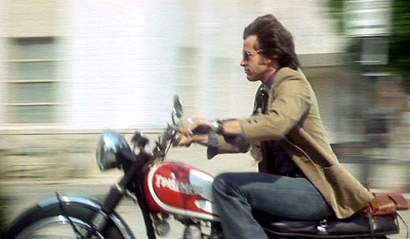
Shampoo is about fucking. As much as each character can get away with. It's a very pre-aids movie. For a script that took eight years to write ― and the writing process was contentious at times ― there's not much of a plot. In a sense it's very much like a Dazed And Confused for the over 30 set. All the action takes place within about a 48 hour period. Beatty plays a vacant hairdresser juggling at least three women at the same time. Goldie is his easily manipulated girlfriend. Julie Christie plays an old flame who's also Goldie's best friend. And Lee Grant plays a client who's giving him a little something something on the side. Grant won an Academy Award for the role.
I must confess I didn't like Shampoo at first, mainly because I'm not a big fan of Warren Beatty. I hated Bullworth and Dick Tracy. And I was ambivalent about Bugsy, although I thought Splendor In The Grass and Reds were fantastic. But Shampoo has grown on me with each viewing. What it lacks in plot, it makes up in great lines. Like these:
GEORGE: Ever listen to women talk? I do till it's running out my ears. They only talk about one thing, How some guy fucked them over. That's all that's on their minds.Lol. I hate to say it, but that's true in many cases. Not mine of course.
Here's some more classic dialogue. Lorna is the teenage daughter of one of the women Beatty's character is banging. She's played by Carrie Fisher in her first feature film role. I love this banter.
LORNA: Are you gay?... baked apple?... they're cold but they're good.They end up screwing, of course.GEORGE: No thanks.
LORNA: Did you hear me?
GEORGE: Yeah.
LORNA: Well, are you? Are you queer?
GEORGE: yeah.
LORNA: (laughing) C'mon, are you or aren't you?
GEORGE: Gee, this is great.
He slices a piece of cheesecake. Lorna sits down, in the
chair nearest him now.LORNA: C'mon, tell me. Don't be afraid.
GEORGE: Why do you wanna know so bad?
LORNA: See if you've been making it with my mother.
GEORGE: What would my being a faggot have to do with that?
LORNA: (shrugs) Nothing, I guess... have you ever made it with a guy?
GEORGE: Have you ever made it with a girl?
LORNA: I asked you first.
GEORGE: Yeah... I've made it with a girl...
Lorna smiles. A pause.
LORNA: Well, are you?
GEORGE: Am I what?
LORNA: Making it with my mother?
There's two or three scenes with Goldie that blew me away. The first that comes to mind is a short scene when Goldie is walking home from an audition, and stops at a fruit stand. It shows the actress's maturation from a comedienne who delivers lines with great timing, to an actress who can show her inner dialogue without speaking a line.
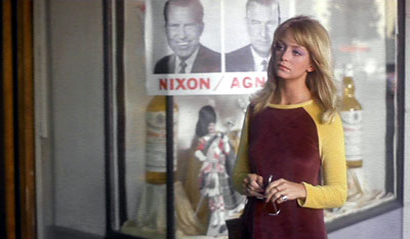
You know she's obsessing over her fight with George, and whether or not to take that acting job, and you can see it all in her face, along with her character's indecisiveness and insecurity. Then she picks up an apple, and for just a moment, you watch her agonize over whether to buy the apple or not until she finally tosses it back in the bin. It's really hilarious.
The shot below is from another scene I love. It shows Goldie just after she got out of a porsche at the election night party, and her boyfriend Beatty is there escorting her best friend into the restaurant. Goldie shoots him a look that is pure daggers. And Beatty has this look like, "oh shit, this is going to be a long night." And it was.
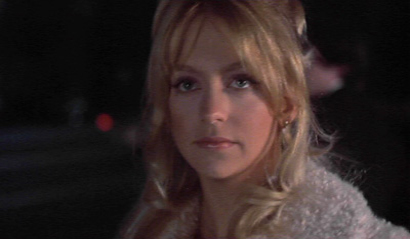
By the way, the silver dress she wore for that election night party was simply adorable, and about as short as legally possible.
There's another great scene at a psychedelic party on a large Beverly Hills estate. Jack Warden's character and Goldie's happen to bust in on Warren Beatty and Julie Christie while they're fucking in the poolhouse. Julie Christie plays Warden's mistress, and Goldie's best friend, so you can imagine both of them are horrified at this discovery. But their reactions are the exact opposite of what you'd expect. It's a terrific scene.
My rating was three stars (liked it), definitely worth a rental. Next up on the AJFF: The Duchess and the Dirtwater Fox.
_______________
* Goldie also starred opposite Warren Beatty in 1971's Dollars. Unfortunately, that film is not yet on DVD, and therefore Netflix doesn't carry it.
Posted by: annika at
12:53 AM
| Comments (8)
| Add Comment
Post contains 976 words, total size 7 kb.
March 04, 2006

Butterflies Are Free, 1972
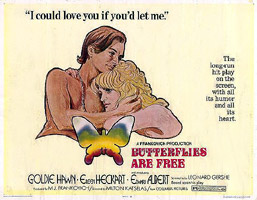 In Butterflies, Goldie plays yet another young waif with more modern sexual mores. Like her first two films, this one is also based on a stage play. The screenplay was written by the original playwright, which is probably the reason why it's so chatty and the action takes place almost completely inside an apartment. Writing for the screen and writing for the stage are two different animals, a fact that is often lost on theater people.
In Butterflies, Goldie plays yet another young waif with more modern sexual mores. Like her first two films, this one is also based on a stage play. The screenplay was written by the original playwright, which is probably the reason why it's so chatty and the action takes place almost completely inside an apartment. Writing for the screen and writing for the stage are two different animals, a fact that is often lost on theater people.
Butterflies is about a blind guy who is trying to gain some independence from his overprotective mother and make it on his own. It's the kind of simple PC message movie that Hollywood made a lot more of in those days: "Blind people are people too." Goldie plays the free-spirited next door neighbor who is afraid of commitment. The conflict arises when Goldie meets the mother (played by veteran TV actress Eileen Heckart, who won a Best Supporting Actress Oscar for this role).
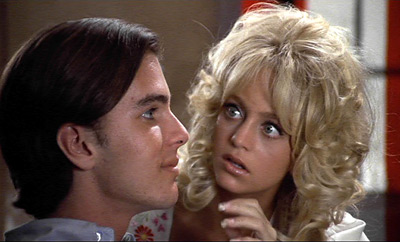
Goldie again demonstrates a surprising dramatic ability in addition to her already established comic talent. As usual, she lights up the screen. Blocking was important in this movie because of the limitations of the apartment set. But Goldie seems to glide effortlessly from couch to floor to kitchen to table to bed. She handles the emotional transitions with the same ease. The drama seems to slow down in the middle of the movie, but things pick up at the end with the addition of Paul Michael Glaser (pre-Starsky, of course) in a bit role as a sleazy director of experimental (i.e. nude) plays.
The blind dude is played by Edward Albert, the son of Green Acres' Eddie Albert. He's an interesting guy. Half Colombian, educated at Oxford, he has an IQ of 157 according to IMDb, and he speaks Spanish, French, Portugese and Mandarin. Unfortunately, I found his constant wisecracking throughout Butterflies to be a distraction. He delivers his sarcastic lines with a deadpan affect that is too annoying for my taste. The mom character is just as sarcastic, but much more appealing.
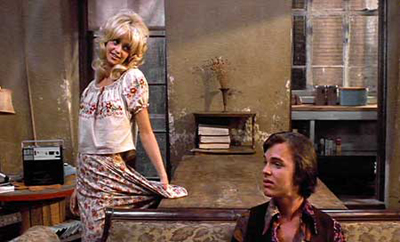
As is my wont, I paid special attention to the costuming. Goldie had three outfits in this film. In the first act, she wore a cute peasant blouse and flirty ankle length skirt, which was her best look. She spends the middle third of the movie in a bra and panties only. I thought Goldie looked a little thick in There's A Girl In My Soup, but I must say, she was in awesome shape for Butterflies. Finally, during the third act she wore a dreary green floral dress, which was nothing to write home about.
As for ratings, I gave Butterflies three stars (liked it). The final act, with it's romantic suspense, saved the movie for me. Yes, I had a few tears. But I cry at the drop of a hat with these kinds of movies. In the end, all three main characters learn something from each other. Personal growth is always a good thing in a romantic comedy, if not in life.
The Sugarland Express, 1974
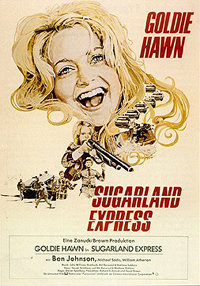 If Butterflies Are Free sounds like too much of a chick-flick for you, definitely check out The Sugarland Express. Not only was it Goldie Hawn's best role to date, it was Steven Spielberg's debut as a feature film director. And what a debut!
If Butterflies Are Free sounds like too much of a chick-flick for you, definitely check out The Sugarland Express. Not only was it Goldie Hawn's best role to date, it was Steven Spielberg's debut as a feature film director. And what a debut!
Long time visitors may have guessed that I'm a scholar of the 70's action movie. I mean I'm really a scholar; I wrote a paper on them in undergrad, when I toyed with the idea of being a film studies major. However, I can't claim to have been much of a scholar if I hadn't seen Sugarland Express up 'til now. I was truly missing out.
Sugarland was Universal's attempt to cash in on the anti-hero chase movie craze of the early 70's. Like another favorite of mine, Dirty Mary Crazy Larry, the main character is a skinny blonde who's as dumb as she is cute. But in Sugarland, the anti-heroes are more loveable than usual. You don't have to sympathize with them in spite of their badness, because they aren't really all that bad.
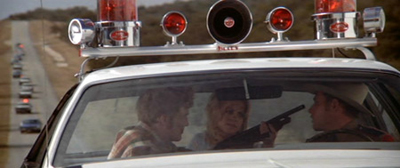
Goldie plays the wife of a small time crook who has just four months left on his sentence for petty crimes. Their kid just got taken away from her and given to a foster home. Goldie breaks her man out of jail and they take off on a comic journey across southeastern Texas to get thier little boy back. Along for the ride is a kidnapped Texas highway patrolman with a slight case of Stockholm syndrome.
The name Sugarland Express is meant to be ironic, because the pursuit is anything but an express. It's more like a 1970s version of OJ's "slow speed chase," complete with cheering throngs of roadside fans. Goldie's character insists on stopping to pee, or to get some fried chicken, or to pick up some trading stamps.
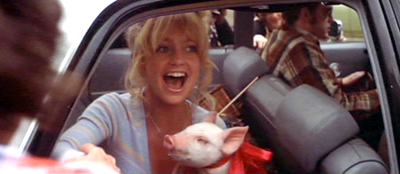
From the first reel on, you can tell that this is not your ordinary Goldie Hawn vehicle. She puts on a pretty convincing Texas drawl (to my Californian ears at least). And her character is grittier than the previous three hippie-chick roles she played. Consequently, It just might be her best performance. She still shows off her comic skills, but thanks to Spielberg's direction and the Barwood/Robbins script (Corvette Summer, Close Encounters) we get to see much more of her considerable dramatic range. With Sugarland, Goldie Hawn gave notice that she was indeed a star.
Goldie's husband is played by William Atherton, better known to me as the slimy reporter from Die Hard, and the meddling EPA dude from Ghostbusters. He does a nice job in Sugarland and it's a shame he became so typecast in his later work.
Although Spielberg had already made Duel as a made-for-TV film in 1971, he really showed the maturity of his talent in Sugarland. It's no wonder that Universal let him do Jaws the very next year. Their faith in the 29 year old director paid off. Say what you want about Munich ― I'm disappointed in that choice too ― but the guy has always known how to put together a great movie. To say that Sugarland Express is underrated is to underrate the word underrated. I gave it five stars (loved it), and I think you'd enjoy it too.
Posted by: annika at
09:42 AM
| Comments (3)
| Add Comment
Post contains 1107 words, total size 8 kb.
64 queries taking 0.0587 seconds, 161 records returned.
Powered by Minx 1.1.6c-pink.









